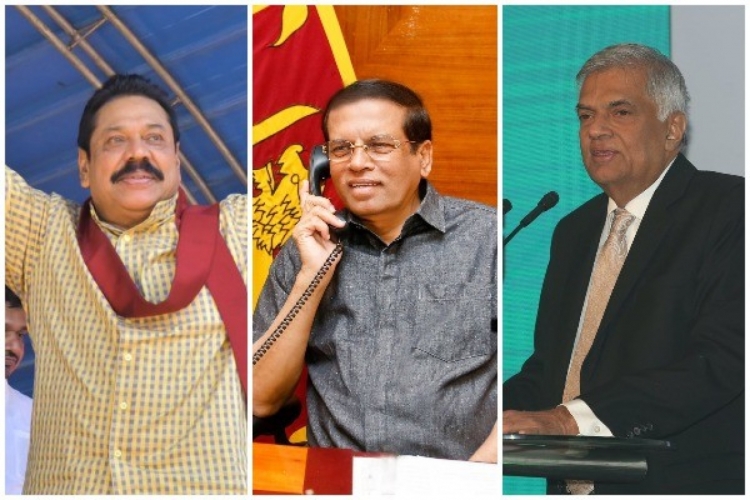SRI LANKAN CONSTITUTIONAL CRISIS
IN NEWS
Sri Lanka’s President Maithripala Sirisena sacked Prime Minister Ranil Wickremeinghe and appointed Mahinda Rajapaksa, as the new Prime Minister — a surprising move that Mr. Sirisena made in order to resolve a deepening political dispute between himself and Mr. Wickremesinghe.
CRUX OF THE ISSUE
The act has only pushed Sri Lanka into an unprecedented constitutional crisis, beginning a potentially dangerous phase of an on-going three-cornered power struggle among three leaders. At the centre of the crisis is the lack of clarity as the new Prime Minister seems to have been appointed without a constitutionally valid vacancy for the position.
The constitution does not grant the President authority to remove a Prime Minister from office. Section 42(4) of the Constitution merely enables the President to appoint a PM. The President has taken the position that since he is the appointing authority, he also has the implicit power to sack the PM. The PM is not a public servant who can be sacked by the appointing authority at his will. It is a constitutional office with protection from the executive. This is the crux of the constitutional dispute.
MR. WICKREMESINGHE ‘S STAND:
Dismissing the constitutional validity of the presidential action, he has argued that he still commands a majority in Parliament. His line of argument is that only Parliament has the constitutionally sanctioned authority to decide whether he could continue in office as PM or not. It also suggests that as long as there is no no-confidence motion passed in Parliament against him and the cabinet, his position as PM cannot be invalidated by the President at his will.
Mr. Wickremesinghe has also cited the fact of having defeated a no-trust motion brought against him a few months ago, and that situation, of Parliament’s majority expressing faith in him, remaining unaltered.
19TH AMENDMENT ACT
It curtailed powers of the President under the 1978 Constitution (the original) as well as the 18th Amendment passed in 2010. Among the presidential powers taken away by the 19th Amendment, which is valid, is the one pertaining to the President’s powers over the PM.
The 19th Amendment, which created a dual executive, made the PM’s position secure from the arbitrary actions of the President. Thus, the office of the PM falls vacant only under limited circumstances. Death, voluntary resignation, loss of support in Parliament, rejection by Parliament of the budget, and ceasing to be an MP are these circumstances. Sacking by the President is certainly not in this list.
NO CLARIFICATION
Mr. Sirisena did not clarify the constitutional issue at hand. He cited political and personal reasons why he could not partner with Mr. Wickremesinghe as the PM. But his assertion that he acted fully in accordance with the Constitution is only a claim. It awaits clarification. What is in dispute is not the total breakdown of relationship between the two leaders, leading to a collapse of their coalition. Contrary to the letter and spirit of the 19th Amendment, no PM will be secure in his/her position against arbitrary dismissal by the President. These circumstances also warrant judicial intervention to resolve the constitutional doubt.
ANALYSIS OF THE POLITICAL CRISIS
- The return of Rajapaksa may dent New Delhi's influence in Colombo, given Wickremesinghe's attempts to re-balance Sri Lanka's foreign relations away from China and toward India and Japan. This transition will ensure that China can once again prevail over Sri Lanka's economy as they have a friend in the prime minister's office.
- The developments in Sri Lanka play into broader rivalry between India and China across the Indian Ocean. Beijing's potential gains in Sri Lanka could make up for the perceived loss of Chinese influence in the tiny archipelago nation of Maldives, where a recent election turfed former President Abdulla Yameen, who had also moved closer to China at the expense of relations with India.
- With Sri Lanka still reeling under debt payments and global market turmoil making international financing less likely, the appointment of Rajapaksa could ensure a steady source of capital from China at a time when few other countries are interested in investing there.
- The challenge for New Delhi will be to engage with Rajapaksa without compromising its moral authority as a beacon of democracy and rights in the region, and at the same time not to upset its local constituency.
- The China factor in Sri Lanka is a major concern for India, but in the months to come it will be the Tamil problem that will test New Delhi's diplomatic latitude.
WAY FORWARD
For now, India can only watch the developments in Sri Lanka from the sideline even as China "welcomes" Rajapaksa. The test for India will be to protect its interests in the region, to ensure that political adventurism does not undermine democratic institutions and that Colombo works towards a settlement of the Tamil issue. It's a long-drawn-out process that requires strategy and patience.
Whatever turn the crisis may take, Sri Lanka’s fragile process of democratic recovery is in peril.


 IAS-2026 - OPTIONAL / GEOGRAPHY / PUBLIC ADMINISTRATION / SOCIOLOGY / ANTHROPOLOGY / ORIENTATION ON 03 & 04-10-2025
IAS-2026 - OPTIONAL / GEOGRAPHY / PUBLIC ADMINISTRATION / SOCIOLOGY / ANTHROPOLOGY / ORIENTATION ON 03 & 04-10-2025 